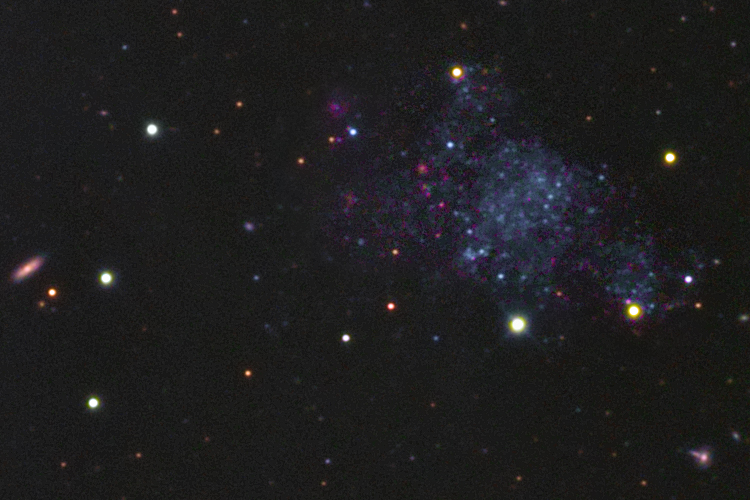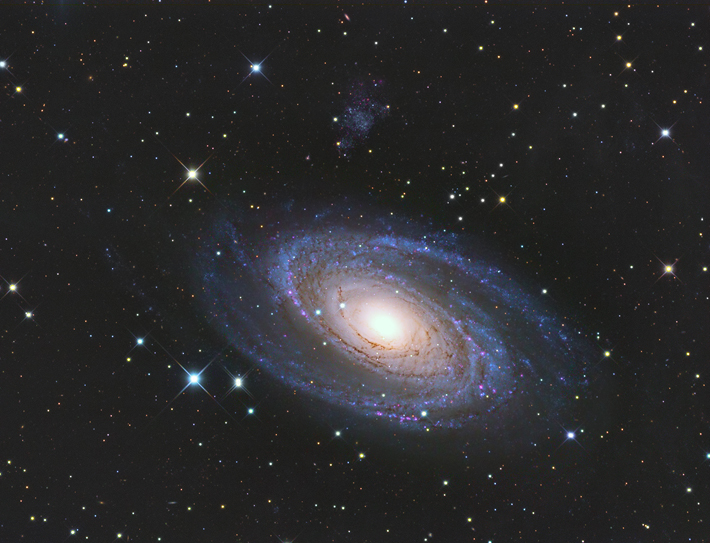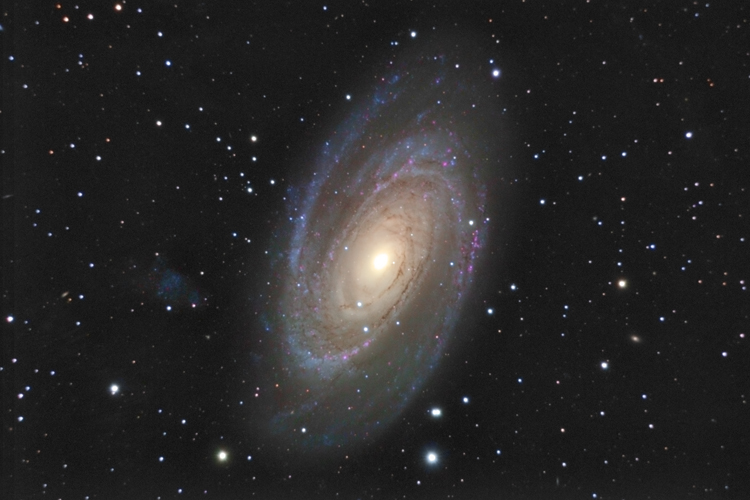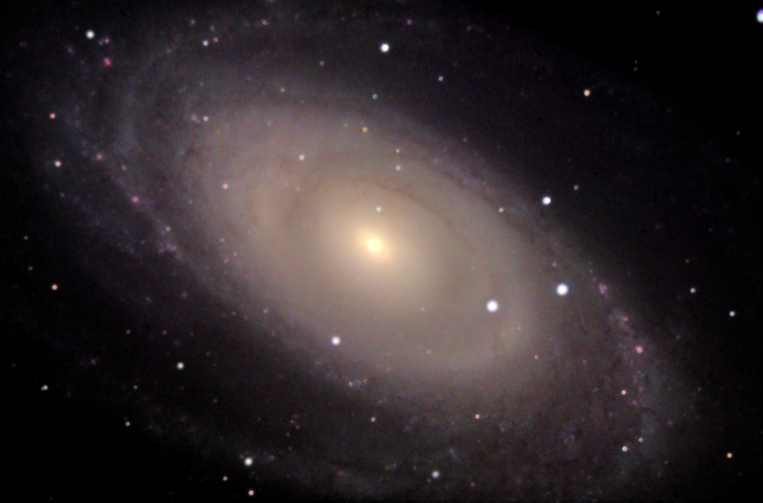|
|
Click the image for 50%
size, 1.28 arcsec/pixel display (1700 x 1300)
Holmberg IX
Dwarf Galaxy @ 0.64 arcsec/pixel
|
 |
|
Instrument |
12.5" RCOS @
~f/9 (2880 mm fl) 0.64 arcsec / pixel. Shown resampled to 3.09
arcsec / pixel. |
|
Mount |
Paramount ME |
|
Camera |
SBIG STL-11000 w/
internal filter wheel, AstroDon Filters |
|
Acquisition Data |
3/18/2009 - 3/31/2009
Chino Valley... with CCDAutoPilot3 |
|
Exposure |
Lum
280 min. (28 x 10 bin 1x1)
RGB
360 min. (12 x 10 bin 1x1) each |
|
Software |
CCDSoft,
CCDStack, Photoshop CS w/ the Fits Liberator plugin,
Noel
Carboni's actions and Russ Croman's Gradient Exterminator
CCDStack to register,
normalize, data reject, combine and luminance sharpen.
PhotoShop for the
color combine. |
|
Comment |
North is to the right.
Messier 81 (also known as NGC 3031 or Bode's Galaxy) is a spiral
galaxy about 12 million light-years away in the constellation Ursa
Major. M81 is one of the most striking examples of a grand design
spiral galaxy. Hinting at a disorderly past, a remarkable dust lane
runs straight through the disk, above and right of the galactic
center, contrary to M81's other prominent spiral features. The
errant dust lane may be the lingering result of a close encounter
between M81 and its smaller companion galaxy, M82.
The loose collection of stars, above the galaxy, is actually a dwarf
irregular galaxy, called Holmberg IX. Holmberg IX is of the
so-called Magellanic type of galaxy, as its size and irregularity in
structure are similar to the Small Magellanic Cloud, a neighbor to
our own Milky Way. Holmberg IX was first discovered by astronomer
Sidney van den Bergh in 1959. It is suspected that the dwarf galaxy
was created as a result of a galactic interaction between M81 and
neighboring galaxy M82.
In the second image,
in HolmbergIX, many red HII star forming regions can be seen. Also
there are a few interesting very distant galaxies, as evidenced by
their color being shifted to the red. The two galaxies, at the lower
right, may be interacting, since they have very similar color
shifting. |
════════════════════════════════════════
Click the image for full size display.
|
Instrument |
Celestron
C11 @ ~f/10.48 (2930 mm fl) 1.26 arcsec / pixel. Shown
resampled to 3 arcsec/pixel. |
|
Mount |
Paramount ME |
|
Camera |
SBIG STL-11000 w/
internal filter wheel, AstroDon Filters |
|
Acquisition Data |
2/10/2008 & 3/4/2008
Chino Valley... with CCDAutoPilot3 |
|
Exposure |
Lum
270 min. (27 x 10 bin 2x2)
RGB
180 min. (6 x 10 bin 3x3) each |
|
Software |
CCDSoft,
Sigma-Clip, Photoshop CS3 w/ the Fits Liberator plugin, and Noel
Carboni's actions |
|
Comment |
North is to the top. |
════════════════════════════════════════
|
Instrument |
Celestron C11 @ F/6.1 (1708 mm) 1.085 arcsec /
pixel |
|
Mount |
Losmandy G11 |
|
Camera |
SBIG ST-7 with CFW-8A color wheel |
|
Acquisition Date |
5/1/04 to 5/14/04
Near downtown Seattle |
|
Exposure |
Lum
240 min. (16 x 15 min)
Red 60 min (4 x 15 min)
Green 60 min (4 x 15 min)
Blue 110 min (5 x 22 min) |
|
Software |
CCDSoft, CCDOPS,
Sigma Clip (pre beta 11), PhotoShop CS and Paint Shop Pro. |
|
Comment |
North
is to the left. I really need a larger field of view. This
only shows a bit more than the galaxy core. |
|




